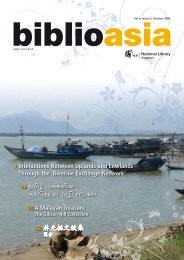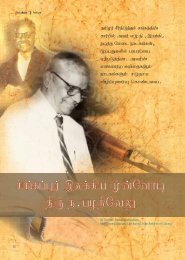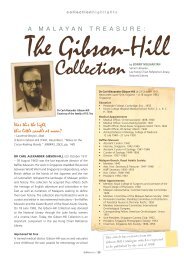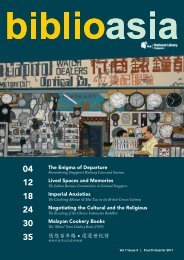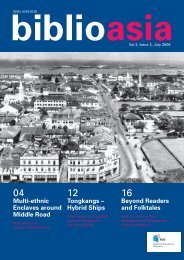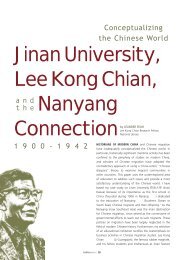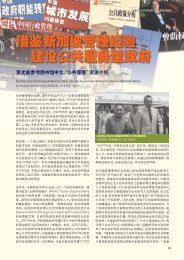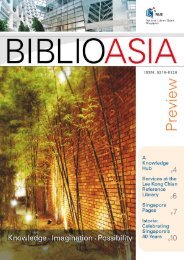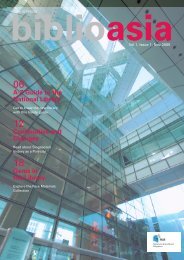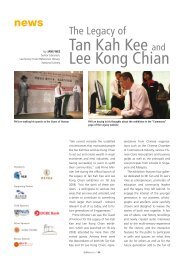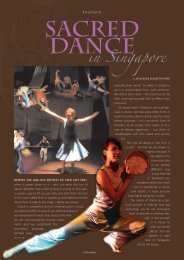Knowledge Economy: Linchpin of ASEAN Integration A View from ...
Knowledge Economy: Linchpin of ASEAN Integration A View from ...
Knowledge Economy: Linchpin of ASEAN Integration A View from ...
You also want an ePaper? Increase the reach of your titles
YUMPU automatically turns print PDFs into web optimized ePapers that Google loves.
feature<strong>Knowledge</strong> Sharingin Singapore’s Public Post-secondaryEducational Institutionssharing experience at three public post-secondary institutions. Theinstitutions were purposively selected to represent the three areas<strong>of</strong> Singapore’s public post-secondary educational processes (i.e.,the public polytechnic, junior college and vocational school level).Readers may refer to Table 1 for a summary <strong>of</strong> the three researchsettingsinformation. As the three post-secondary institutions caterto different groups <strong>of</strong> students and employ different educationalstrategies, it seems logical to expect that their requirementsfor knowledge will differ and so will their practices in sharingknowledge.Since the focus is to obtain an understanding about the nature<strong>of</strong> knowledge sharing processes itself, as it is instantiated at threeselected post-secondary institutions, case studies were deemedmost appropriate (Yin, 1994, 2003), with the premise that knowledgesharing practice (a human affair that is tied to human behaviour)is a “complex instance,” multi-dimensional and open-ended, <strong>of</strong>tentypified by multiple perspectives and competing judgments.Besides, underlying this is the recognition that human behaviourscannot be meaningfully understood simply as rule-governed acts;and that concrete, context-dependent knowledge is more valuablethan the vain search for predictive theories and universals (Cziko,April 1989; Flyvbjerg, 2006).Each site constitutes a single case. The main data was collected<strong>from</strong> semi-structured interviews and supplemented with findingsobtained <strong>from</strong> surveys, classroom observations, archival paperclippings on the institutions, community records and documents,institutional and governmental publications. A total <strong>of</strong> 65 interviews(average 40 minutes/interview) were conducted (although only 40interviewees agreed to have their data published), and surveyswere collected <strong>from</strong> 177 students and 49 staff. Fifteen classroomobservations were made across the three sites. Findings <strong>from</strong>each case are used to determine if there exists a common set <strong>of</strong>institutionalised patterns across the different post-secondaryeducational settings. This blended approach is useful in providingfine-grained, detailed descriptions <strong>of</strong> classroom behaviours togenerate more general assertions about ways staff can foster goodby Chiam Ching LeenLee Kong Chian Research FellowNational LibraryContextual BackgroundThe knowledge-based economy has ushered in a new era in whichknowledge is at the center <strong>of</strong> productivity and economic growth.Against this backdrop, what is striking is that public post-secondaryinstitutions, whose purpose is ostensibly for preparing our youngpeople, who are essential to our nation’s competitiveness andcontinuity, have now come under greater pressure to become morerelevant in instilling knowledge sharing (Fullan, 2001; Organisationfor Economic Co-operation and Development, 2004). <strong>Knowledge</strong>sharing has been promoted as a vehicle for greater knowledgeproductivity (Fullan, 2001; Hargreaves, 2000, Sallis, 2002).Notwithstanding this, evidence to date suggests that public postsecondaryeducational institutions are lagging behind in terms <strong>of</strong>knowledge sharing. A sense <strong>of</strong> this is revealed in Hargreaves’ (2000)presentation at the OECD de la Muette, in which Hargreaveas hashighlighted the dire lack <strong>of</strong> knowledge sharing in schools. Hargreavesreported, based on his anecdotal experience, that the principals hehad engaged with admitted to having staff with several centuries<strong>of</strong> pr<strong>of</strong>essional experience and yet only about 5 to 15 percent <strong>of</strong>their collective knowledge was shared by all the teachers. It waslearnt that most <strong>of</strong> the teachers’ pr<strong>of</strong>essional knowledge is acquiredthrough trial and error learning alone, in the isolated classroom, andtherefore locked into their individual heads.WHY DOES IT MATTER NOW, HERE IN SINGAPORE?There are at least three reasons reinforcing the need for such astudy in Singapore.First, the changing demographic <strong>of</strong> the teaching workforce, inwhich a large pool <strong>of</strong> Singapore’s most experienced teachers willretire in the next five years (Ministry <strong>of</strong> Education Singapore, 2005)highlights the need to make available the knowledge which is thelegacy <strong>of</strong> these experienced teachers.Second, there are clear indicators that regional countries haveclosed the gap with Singapore in terms <strong>of</strong> knowledge competitiveness(Bhaskaran, Khanna, & Giap, 2003, Huggins, Izushi & Davies, 2005).Singapore cannot afford to remain indifferent to such competitionas the small nation has limited natural resources and that makesher vulnerable to world economic competition. Besides, thereare stronger reasons for educational institutions in Singapore topromote knowledge sharing to remain competitive. The prospects <strong>of</strong>knowledge sharing in improving knowledge capacity, capability andcompetency seem much more possible in Singapore than elsewheredue to her “extra-educational” contexts and conditions, “because <strong>of</strong>scale <strong>of</strong> the system, because <strong>of</strong> concerted government and privatesector and community commitment to education, because <strong>of</strong>synergies between ministries and sectors <strong>of</strong> the community” (Luke,2003, p. 2).Third, an examination <strong>of</strong> published articles retrieved <strong>from</strong>relevant databases 1 shows that no multi-institutional studies onknowledge sharing at the post-secondary (pre-university) havebeen undertaken.There is so much riding on the need for knowledge sharing andthat variations are likely across institutional contexts. Thus, theimportance <strong>of</strong> an exploratory study, contextually-grounded in thenaturalistic setting <strong>of</strong> post-secondary institutions to investigate howknowledge sharing is instantiated in Singapore’s post-secondaryeducational institutions cannot be undermined. It is throughcontinuing efforts at discussion, education, and demonstration thatthe necessary support for knowledge sharing studies in educationalinstitutions can be obtained.THE STUDYThis study begins with the effort in investigating and documentingportrayals <strong>of</strong> academic staff’ and students’ accounts <strong>of</strong> knowledgeTable 1: Summary <strong>of</strong> the three research-settings informationEducational InstitutionsUnderstudiedPolytechnic(Org A)Junior College(Org B)Vocational Institute(Org C)Educational ApproachProblem-basedLearning (PBL)as exclusive educativeapproachAcademic Lectures,Tutorial andLaboratory sessionsTechnical Lectures,Tutorial and PracticalAttachmentPredominant LearningCultureExamination-orientedTaskcenteredActivitybasedNote: Out <strong>of</strong> respect for the institutions, names used are pseudonymsTable 2: Ranking <strong>of</strong> types <strong>of</strong> knowledge <strong>from</strong> (1) most important to (8) least importantClass PedagogyStudent-ledpedagogyTeacher-ledpedagogyTeacher-ledpedagogyModes Of EvaluationTeam performanceand individualassessmentMostly individualassessment, even ingroup workTeam performance inproject work andindividual assessmentRank Polytechnic (Org A) Junior College (Org B) Vocational Institute (Org C)1 <strong>Knowledge</strong> about curricula <strong>Knowledge</strong> on subject matter <strong>Knowledge</strong> about general goals,purposes and values2 <strong>Knowledge</strong> on subject matter <strong>Knowledge</strong> on pedagogy <strong>Knowledge</strong> on pedagogy3 <strong>Knowledge</strong> about general goals,purposes and values4 <strong>Knowledge</strong> about students’ conceptionsand difficulties<strong>Knowledge</strong> about curricula<strong>Knowledge</strong> about students’ conceptionsand difficulties5 <strong>Knowledge</strong> on pedagogy <strong>Knowledge</strong> about general goals,purposes and values6 <strong>Knowledge</strong> about parents’ expectations <strong>Knowledge</strong> <strong>from</strong> the reflections <strong>of</strong> othercolleagues7 <strong>Knowledge</strong> <strong>from</strong> the reflections <strong>of</strong> other <strong>Knowledge</strong> about parents’ expectationscolleagues8 1 <strong>Knowledge</strong> about public’s perception <strong>Knowledge</strong> about public’s perception8 1 <strong>Knowledge</strong> about politics in the college8 1 <strong>Knowledge</strong> <strong>from</strong> other related disciplines8 1 <strong>Knowledge</strong> about staff’s and students’emotional quotient<strong>Knowledge</strong> about students’ conceptionsand difficulties<strong>Knowledge</strong> about curricula<strong>Knowledge</strong> on subject matter<strong>Knowledge</strong> <strong>from</strong> the reflections <strong>of</strong> othercolleagues<strong>Knowledge</strong> about parents’ expectationsNote: 8 1 These categories <strong>of</strong> types <strong>of</strong> knowledge were added by the academic staff and each had an equal number <strong>of</strong> respondents, hence,were ranked equally.4




